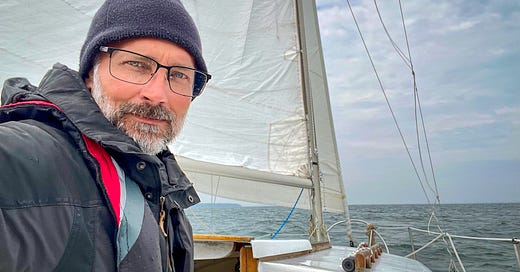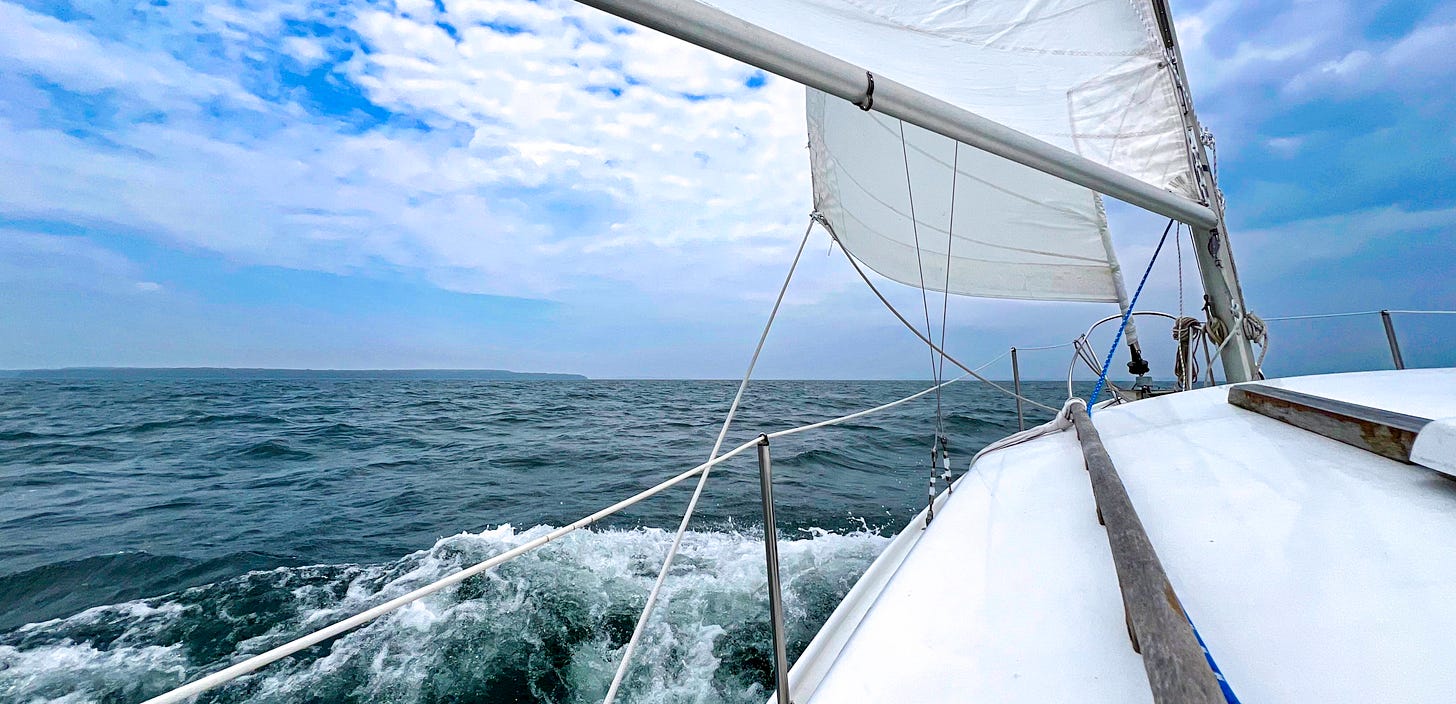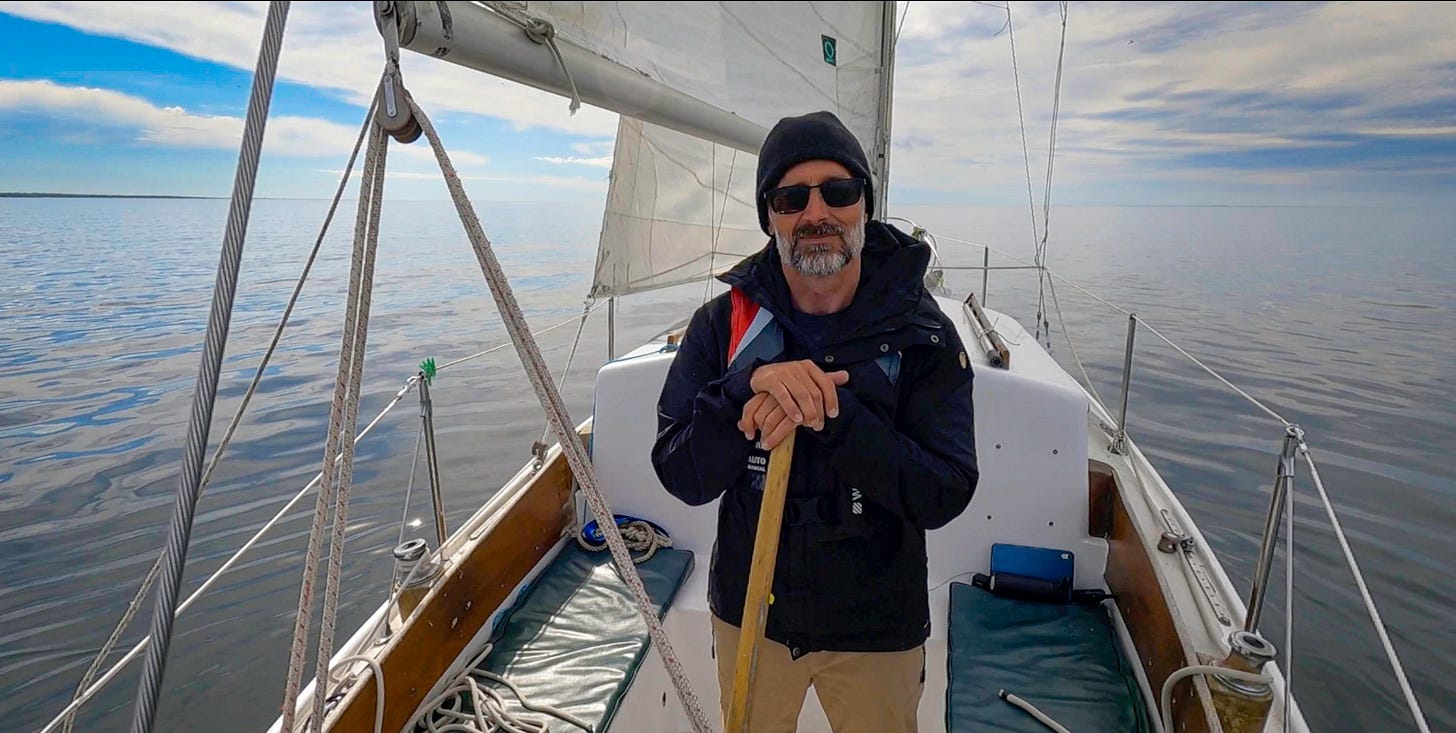Sailing Solo? 3 Steps to Avoid the Siren Song of Disaster
Know thy boat; Sailing is the priority; Even priorities can wait
Solo sailing is a high-stakes game. One wrong move, one moment of inattention, can turn a dream voyage into a nightmare. I’ve seen it happen, and I’ve learned from my own mistakes.
I’m a new solo sailor, and last year completed 500 nautical miles, sailing alone through the Great Lakes of the United Sates and Canada. It was a great adventure and a challenging one too. I learned a lot, and I have a lot to learn.
Most people don't understand the allure of solo-sailing. They picture a lonely figure battling monstrous waves, a nautical hermit braving the elements. And while there's certainly an element of challenge, the real draw is something far more profound: a chance to connect with the sea, with your own inner resources, in a way that’s simply impossible with a crew.
This article addresses the potential dangers and challenges of solo sailing, offering advice on how to mitigate risks and avoid disasters. Reading the article to the end, you will gain practical, hard-won advice on how to safely and successfully undertake solo sailing. Essentially, this article is a condensed guide to avoiding common pitfalls and can increase your chances of a safe and enjoyable solo-sailing experience.
Know Thy Boat: The First Commandment of Solo Sailing
It's a common misconception that sailing is just about reading charts and trimming sails; no, it’s about understanding the intimate language of your vessel. It's about knowing its quirks, its whispers, its groans, and its screams. Imagine trying to converse with a brilliant but eccentric companion without understanding their particular dialect – frustrating, isn't it? The same holds true for your boat. It's your partner in the vast, often unpredictable, theater of the sea, and a deep understanding of its character is paramount, especially when you're out there, alone, miles from shore.
The first, and perhaps most crucial, commandment of solo sailing is: Know Thy Boat.
I'm not talking about knowing its name or the color of its hull. I mean really knowing it. Every line, every sail, reefing system, bilge, electronics, every creak. Your boat is your partner in this endeavor, and you need to understand its language. Imagine trying to drive a car without knowing how to change gears or check the oil. Madness, right? The same goes for sailing. Spend time with your vessel. An hour a day, minimum, should be dedicated to maintenance, familiarization, and just plain getting to know its personality. It's an investment that will pay off tenfold when you're out there, miles from shore, and the wind starts to howl.
Speaking of howling wind, let's talk about reefing. This is the art of reducing your sail area in strong winds. It's a skill that's often overlooked, but it's absolutely essential for safety and comfort. Most people practice raising sails, but lowering and reefing them in a blow is a different beast altogether. It's like trying to wrestle a wet octopus in a hurricane. Practice, practice, practice. And when you think you've got it down, practice some more. Because when the wind picks up, you won't have time for fumbling around with lines and trying to remember what Doug, your sailing instructor, showed you six months ago.
And if you're buying a boat, for the love of Neptune, get a proper shakedown cruise. Don't just take the previous owner's word for it that everything is in working order. Insist on a guided tour, a deep dive into the boat's systems. Ask questions, even the dumb ones.
Sailing is the priority
Now, let's talk about distractions. This is the digital age, and we're all addicted to our devices. But when you're sailing solo, your phone, your tablet, and even your fancy chartplotter can be a dangerous distraction. I've done it myself: 5 seconds engrossed in making a YouTube video followed immediately by troubles with my chart plotter, and I found myself running aground on a clearly marked reef. A few seconds, and that’s all it took. Embarrassing? Yes. You don’t want to be that guy. Your primary focus should be on sailing the boat. Everything else is secondary.
And speaking of chartplotters, remember that technology can fail. Batteries die, software glitches, GPS signals get lost. That's why it's crucial to always check your course visually and have backup charts that are easy to access if you need them. Use your eyes, your compass, your charts. Develop a sense of where you are and where you're going. It's not just about safety; it's about connecting with the environment in a deeper way.
Even priorities can wait
Another cardinal sin of solo-sailing is rushing. Rushing leads to mistakes, and mistakes on the water can have serious consequences. Plan ahead, give yourself extra time, and prepare your boat well in advance of departures or dockings. Don't be afraid to slow down. If the weather looks dodgy, wait it out. If you're feeling tired, take a break. This brings me to my next point: rest.
Rest is absolutely crucial for solo sailors. Fatigue leads to physical strain, poor decision-making, and increased risk of injury. Don't try to be a superhero. Take rest days, pace yourself, and listen to your body. It's better to arrive at your destination a day later than not arrive at all.
Finally, prepare for docking well in advance. Have your fenders, lines, and docking equipment ready long before you reach the dock or anchorage. Don't be scrambling around at the last minute, trying to tie knots and fend off other boats while you're also trying to steer and manage the sails. It's a recipe for disaster.
Solo sailing is a demanding undertaking. It requires focus, organization, and a healthy respect for the power of the sea. But it's also an incredibly rewarding experience. There's nothing quite like the feeling of being out there, alone with the wind and the waves, relying on your own skills and judgment. Just remember: know your boat, avoid distractions, and put safety first. If you follow these simple rules, you'll not only increase your chances of having a safe and enjoyable voyage, but you'll also open yourself up to the magic of solo sailing, the quiet communion with the sea that makes it all worthwhile.
Until the next time
Solo sailing is an experience like no other. It offers a unique connection with the sea, but it demands meticulous preparation and respect for the elements. It’s a strange relationship of managing emotions, physical well-being, and a marine vessel with a mind of its own. The key to safe solo sailing is intimate knowledge of your boat, including its systems and how to reef sails effectively, gained through consistent maintenance and practice. Thorough shakedown cruises are essential before any voyage. Minimize distractions, especially from technology, and always back up electronic navigation with traditional methods. Avoid rushing, prioritize rest to combat fatigue, and plan docking procedures in advance. By prioritizing safety, preparation, and a deep understanding of your vessel, solo sailors can experience the profound rewards of this challenging pursuit and enjoy the process, not be defeated by it.
I know there’s a lot more for me to learn before I tackle longer and more challenging passages. I will train, and study and do what I can to prepare myself until the next time.
You might also like:
Why Skills Matter in the Age of Exploration - Enter KnotSkool
The modern outdoorsman, I believe, is more than just a consumer of gear. They are a craftsman, a problem-solver, a student of the natural world. Knowing how to navigate by the stars, purify water, and build a shelter from the elements – these aren't just survival tactics; they are keys to deeper immersion, to a more profound connection with the wild.
Think of it this way. Learning to tie a proper knot isn't just about securing gear; it's about understanding friction, leverage, and the subtle interplay of forces. Building a fire isn't just about warmth; it's about understanding combustion, airflow, and the delicate dance of tinder, kindling, and fuel. These skills aren't just technical; they are a way of thinking, a framework for understanding the natural world on its own terms.
The rewards extend far beyond the practical. Mastering a wilderness skill fosters a sense of self-reliance and accomplishment. It connects us to a rich human history of ingenuity and adaptation. It deepens our appreciation for the natural world, not as a passive backdrop for our adventures but as a dynamic system with its own intricate rules and rhythms.








Also read the Hornblower series of books and Patrick O'Brian's Jack Aubrey series. There is a huge amount of sailing knowledge in them.
Imagine that you are on a Royal Navy ship and you'll get twelve lashes with the cat if you don't pay attention to where you're going, slack off, fail to get into or out of a harbour without damage or fail to rig the sails properly. :)